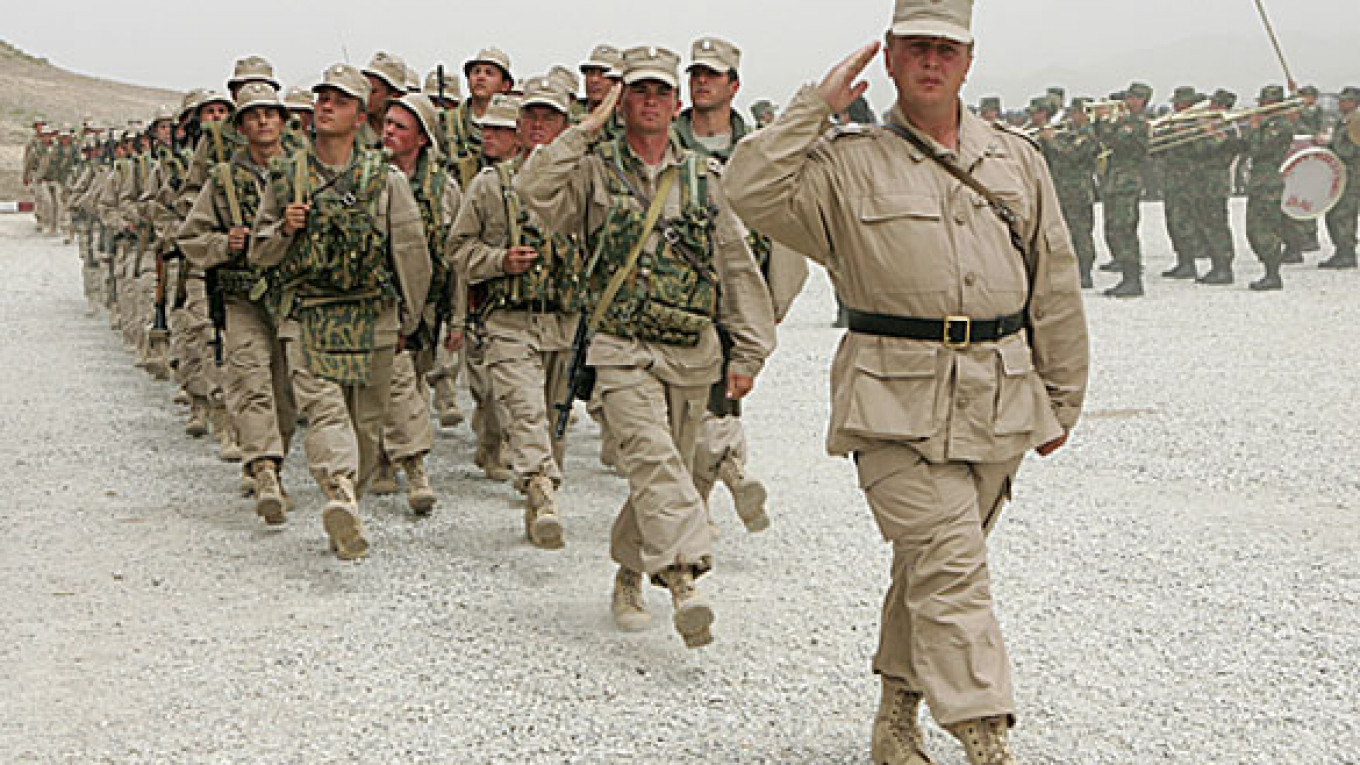DUSHANBE — Tajikistan's parliament ratified a deal with Russia on Tuesday to extend by three decades Moscow's military presence in the volatile Central Asian nation, which may face new security threats after NATO troops leave neighboring Afghanistan.
The agreement to prolong the rent-free lease on the 201st military base, Russia's biggest military deployment abroad, was signed in the presence of President Vladimir Putin and his Tajik counterpart Emomali Rakhmon last October.
But it took a year for Tajikistan to win better terms for one million of its migrant workers in Russia and ensure duty-free imports of one million tons a year of Russian oil products in exchange for keeping the base on its soil, sources close to the deal said.
"This agreement is in line with the principles of strategic partnership [with Russia]. It guarantees stability in the region and security in Tajikistan," Tajik Defense Minister Sherali Khairulloyev said before the vote.
All 57 deputies who were present in the lower chamber voted for the base deal. A forthcoming vote in the docile upper house is seen as a formality in Tajikistan, where Rakhmon wields vast powers.
Migrant workers, mainly those in Russia, are the backbone of the rickety economy, whose other cash earners are aluminum and cotton exports. Worker remittances totaled $3.3 billion, or 43.3 percent of Tajikistan's gross domestic product, in 2012.
Russia will also help modernize Tajikistan's army with equipment and officer training, Khairulloyev said.
Russian troops helped Rakhmon's secular government to withstand Islamist guerrillas in a 1992-97 civil war, which devastated the country and killed tens of thousands of people.
The new deal extending the lease until 2042 comes as Rakhmon is poised to seek a new seven-year term in polls set for Nov. 6, which would lengthen his rule to almost three decades.
Moscow, which has about 6,000 soldiers stationed in three Tajik towns, has chosen the Muslim nation of 8 million as its main line of defense against the threat of Islamist radicals spreading from Afghanistan, as well as drug trafficking.
The previous base deal would have expired on Jan. 1, 2014. NATO troops are due to leave Afghanistan in the same year.
Putin, a critic of many U.S. and NATO policies, has expressed his concern over the drawdown of multinational troops from Afghanistan, which he said might cause more instability along Russia's southern flanks.
Last month, he warned ex-Soviet allies that Islamist militancy fueling the war in Syria could reach their countries, some of which have Muslim majorities.
He said Moscow and its allies would provide "additional collective assistance" to Tajikistan to guard its border with Afghanistan after the pullout of most combat troops in 2014.
Rakhmon, a 60-year-old former director of a cotton farm, has ruled with a firm hand since 1992, tolerating little dissent.
His critics argue that, apart from Islamist militancy spreading from Afghanistan, it is his tough policies and poverty that push many young people to embrace religious radicalism.
Tajik analyst Zafar Abdullayev said he believed that Russian troops would not be a serious deterrent for Taliban-style militants if they decided to break through the remote and porous 1,344 km Tajik-Afghan border.
"If they decide to 'attack', this will be done the way it is done elsewhere in the Muslim world, they will first change the Tajiks' psychology, making them kill infidels," he said.
"This enemy will not be visible in the air or on the border."
A Message from The Moscow Times:
Dear readers,
We are facing unprecedented challenges. Russia's Prosecutor General's Office has designated The Moscow Times as an "undesirable" organization, criminalizing our work and putting our staff at risk of prosecution. This follows our earlier unjust labeling as a "foreign agent."
These actions are direct attempts to silence independent journalism in Russia. The authorities claim our work "discredits the decisions of the Russian leadership." We see things differently: we strive to provide accurate, unbiased reporting on Russia.
We, the journalists of The Moscow Times, refuse to be silenced. But to continue our work, we need your help.
Your support, no matter how small, makes a world of difference. If you can, please support us monthly starting from just $2. It's quick to set up, and every contribution makes a significant impact.
By supporting The Moscow Times, you're defending open, independent journalism in the face of repression. Thank you for standing with us.
Remind me later.






